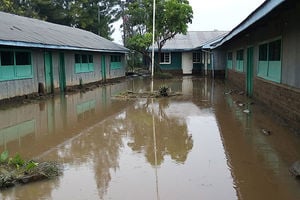All SMEs to be listed to ease award of contracts

Adan Mohamed, Cabinet Secretary Industrialisation. PHOTO/ANTHONY OMUYA (NAIROBI)
What you need to know:
- The data bank will contain such details as the owner’s gender, age, and county of origin which will be used for analysis and informing decisions such as the parts of the country that require more focus than others.
- On Monday, ministry of industrialization said that regulations to make it easier for small and medium enterprises (SMEs) in the sector to navigate complex government procurement processes would be published over the next few months.
The government is set to start registration of all small and medium enterprises in the country in a move expected to ease their identification while bidding for public contracts.
Yesterday, the chief executive officer of the recently formed Micro and Small Enterprises Authority (MSEA), Mr Patrick Mwangi, said the organisation would soon establish a registrar to build a data bank that public organisations will use to identify legal businesses and rid the market of quacks operating non-existent companies.
“This will be important as SMEs brace themselves for increased participation in government jobs, given the presidential directive that at least 30 per cent of public contracts be given to firms owned by youth and women, most of which small and medium,” Mr Mwangi.
He was speaking during proceedings of the on-going Kenya Industrialisation Week at the Kenyatta International Convention Centre (KICC).
As part of the Industrialisation Week celebrations, Cabinet Secretary Adan Mohammed will today launch the country’s industrialisation roadmap for the period 2013-2017.
The roadmap will align the country’s industrial efforts to the national development blueprint, the Vision 2030.
The data bank will contain such details as the owner’s gender, age, and county of origin which will be used for analysis and informing decisions such as the parts of the country that require more focus than others.
On Monday, ministry of industrialization said that regulations to make it easier for small and medium enterprises (SMEs) in the sector to navigate complex government procurement processes would be published over the next few months.
“To increase the preference of locally made products, the government is planning on validating the draft regulations on furniture and then gazetting the final draft by end of March next year,” said senior industrial development officer, Mr Julius Kirima.
Partly to address this problem, in 2010 former President Mwai Kibaki issued a directive directing public offices in the country to only purchase furniture made locally.
The ministry of industrialization said that it would also engage artisans in the sector in skills development programmes.
Further, targeted research would be carried out in the market to determine areas of growth in domestic furniture manufacturing.
The formation of a furniture and metal fabricators association to lobby on behalf of the sector was also mooted.





